|
|
|
Sort Order |
|
|
|
Items / Page
|
|
|
|
|
|
|
| Srl | Item |
| 1 |
ID:
117486
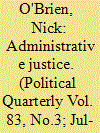

|
|
|
|
|
| Publication |
2012.
|
| Summary/Abstract |
This article argues that the political significance of the Coalition government's proposed changes to administrative justice, including the abolition of the Administrative Justice and Tribunals Council, is in danger of passing unnoticed, despite its potential significance for the Big Society agenda. It suggests that the retrieval of genuine perspective lies in paying closer attention both to the contemporary importance of administrative justice and to the political debates of the 1950s and 1960s, which set opposing views of administrative justice in broadly libertarian and egalitarian contexts respectively. It concludes that the recovery in particular of an egalitarian account of administrative justice is necessary to animate, and rebalance, the debate. Administrative justice might then be perceived as an essential part of a broader political vision and a significant aspect of social justice more ambitiously conceived.
|
|
|
|
|
|
|
|
|
|
|
|
|
|
|
|
| 2 |
ID:
117483


|
|
|
|
|
| Publication |
2012.
|
| Summary/Abstract |
The largest ever rebellion of Conservative MPs on Europe took place in October 2011 with 81 Conservative MPs defying the Conservative whip to vote for a referendum on Britain's continued membership of the European Union. This resurgence of dissent over Europe has been fuelled by the crisis in the eurozone. The Conservative party is now an overwhelmingly Eurosceptic party, but Conservative Eurosceptics are divided over whether the Government should use the opportunity of the eurozone crisis to take Britain out of the European Union, or whether it should seek to negotiate a looser arrangement, or do nothing at all. Conservative policy on Europe has been further complicated by the coalition with the Liberal Democrats, and by the consequences for the British economy if the eurozone disintegrates. Public opinion is also divided. British policy on the European Union remains ambivalent and muddled because British aims are inconsistent, and because there is no consensus on where Britain's interests truly lie.
|
|
|
|
|
|
|
|
|
|
|
|
|
|
|
|
| 3 |
ID:
117485
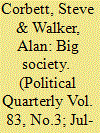

|
|
|
|
|
| Publication |
2012.
|
| Summary/Abstract |
This article contributes to the steady flow of critiques of the big society idea contained in The Political Quarterly. It focuses chiefly on two sets of parallels. The first is between the big society and the policies pursued by the Thatcher government which, despite their obvious rhetorical differences, contain many striking similarities, including their neoliberal origins, application of the 'crowding out' thesis and uncritically idealised notions of community. The second is between the big society and a policy with the same name pursued doggedly by the Chinese Communist Party for nearly 20 years until being abandoned as a failure. Lessons for the Prime Minister's flagship policy are drawn from the Chinese experience. The article concludes with a welcome for the rediscovery of the social by public policy and some suggestions as to how a more participative and democratic state could follow from this breakthrough.
|
|
|
|
|
|
|
|
|
|
|
|
|
|
|
|
| 4 |
ID:
117494


|
|
|
|
|
| Publication |
2012.
|
| Summary/Abstract |
Immigration presents a daunting challenge to successive British governments. The public ranks immigration as one of the leading policy issues after the economy and employment. There is also greater public support for stronger immigration controls than in many other countries. In response, government strategy has included the use of a citizenship test. While the citizenship test is widely acknowledged as one key part of immigration policy, the test has received surprisingly little critical analysis. This article is an attempt to bring greater attention to serious problems with the current test and to offer three recommendations for its revision and reform. First, there is a need to revise and update the citizenship test. Secondly, there is a need to expand the test to include questions about British history and basic law. The third recommendation is more wide-ranging: it is that we reconsider what we expect new citizens to know more broadly. The citizenship test should not be viewed as a barrier, but as a bridge. The focus should centre on what future citizens should be expected to know rather than how others might be excluded. The test should ensure that future citizens are suitably prepared for citizenship. There is an urgent need to improve the test and this should not be an opportunity wasted for the benefit of both citizens and future citizens alike.
|
|
|
|
|
|
|
|
|
|
|
|
|
|
|
|
| 5 |
ID:
117490


|
|
|
|
|
| Publication |
2012.
|
| Summary/Abstract |
This article examines the implications of the 2011 phone hacking scandal for press freedom in the United Kingdom. Specifically, it argues that the language of rights has too long dominated public discourse, which has led to discussion of media responsibilities being evaded. The article argues that there is now an opportunity for a radical restructuring of the relationship between the press, the public, and the political system that restores the media to their rightful role as a watchdog on government and steward of the people. It points to the need for independent regulation of the press and a statutory right of reply as means through which the relationship between media and citizen can be recast on the grounds of obligation and responsibility but argues that it is only when we move away from a framework grounded in rights to one grounded in responsibilities that meaningful change can flourish.
|
|
|
|
|
|
|
|
|
|
|
|
|
|
|
|
| 6 |
ID:
117493
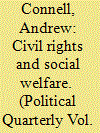

|
|
|
|
|
| Publication |
2012.
|
| Summary/Abstract |
This article draws on T H Marshall's celebrated classification of civil, political and social rights to examine the use of the courts by individuals seeking to establish rights to particular forms or models of welfare service provision. It argues that tensions between the collective and individual aspects of social rights, the relationship of social rights to inequality, and the difficulty of quantifying (and therefore enforcing) legitimate expectations, all make the use of litigation to establish social rights intensely problematic. Drawing on the recent UK Supreme Court case of R (on the Application of McDonald) v Royal Borough of Kensington and Chelsea, it goes on to suggest that it is unhelpful to think of social rights in terms of human rights: instead, we would do better to adopt Marshall's emphasis on the citizenship basis of social rights and on the social and political context within which they necessarily exist.
|
|
|
|
|
|
|
|
|
|
|
|
|
|
|
|
| 7 |
ID:
117489


|
|
|
|
|
| Publication |
2012.
|
| Summary/Abstract |
The Credit Crunch ushered in an era of austerity with massive cuts and job losses. It highlighted the gulf between the world of real people and the abstraction of high finance. Put simply, to prevent the melt-down of the global economy, the needs, hopes and ambitions of millions are being sacrificed. Who controls and issues money is key. To be viable any system must be big enough for people to have faith it won't fail, and it has to be administered soundly. Local government is accountable to its electorate and, as such, should put their welfare first. It is essentially an administrative machine and certainly isn't going to go away. A truly local economy could emerge with authorities initially paying part of their staff's wages in local currency and accepting it in payment of rates. At a stroke, job cuts could be reversed and people's skills and experience valued again.
|
|
|
|
|
|
|
|
|
|
|
|
|
|
|
|
| 8 |
ID:
117498
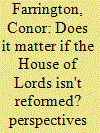

|
|
|
|
|
| Publication |
2012.
|
| Summary/Abstract |
In May 2011 the Coalition government published a draft bill for reform of the House of Lords, proposing an upper chamber composed of 80% elected and 20% appointed members serving for single 15-year terms. These plans reflect aspects of the stated positions of the main political parties, votes in the House of Commons, and broader political and scholarly debates over the past decade. Nevertheless, there is significant opposition from across the political spectrum, and there is a significant possibility that the proposed reforms will not be enacted before the next general election. This article draws on the views of participants (including three current peers) in a Symposium at Trinity Hall, Cambridge to argue that the likely failure of the reforms may be less disastrous than many suppose. Especially since the 1999 reforms, the House of Lords is in many ways a more active and legitimate chamber than is commonly realised.
|
|
|
|
|
|
|
|
|
|
|
|
|
|
|
|
| 9 |
ID:
117496
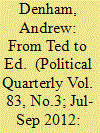

|
|
|
|
|
| Publication |
2012.
|
| Summary/Abstract |
Since 1965, British political parties have radically, and repeatedly, changed the ways in which they choose their leaders. In this article, I explain how and why these changes occurred and assess the consequences of the 'new' selection procedures adopted by four 'mainstream' parties: Labour, the Conservatives, the Liberal Party and the Liberal Democrats. In the first section, following Sjoblom and Stark, I outline a theoretical framework which purports to explain the criteria used by parties in parliamentary systems when choosing their leaders. I then examine the four parties in turn and consider two questions. First, how and why has the process of selecting British party leaders changed over time; and secondly, to what extent, and why, have the 'new' selection procedures adopted since 1965 produced different outcomes, resulting in the election of leaders who would not have been chosen had the decision rested with their party's elites and/or MPs alone?
|
|
|
|
|
|
|
|
|
|
|
|
|
|
|
|
| 10 |
ID:
117482
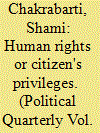

|
|
|
|
|
| Publication |
2012.
|
| Summary/Abstract |
New Labour arguably left Britain more comfortable in its diversity and better protected by anti-discrimination law. Equal treatment for gay people advanced significantly and the Human Rights Act provides a modern Bill of Rights for everyone in the Kingdom. Curiously however, parallel laws dishonoured these values in thought, word and deed. Home affairs hyperactivity left ours a less friendly country in which to seek asylum, dissent or even be young. The Coalition bound itself together with 'civil liberties' and quickly reversed some excesses of the previous decade. Last year's 'Arab Spring saw it promote human rights abroad. However the Government appears bitterly divided by them at home. Is the debate about a more 'British' Bill of Rights, political genius, pragmatic fudge or a dangerous swindle capable of depriving us all of vital protection against abuse of power?"
|
|
|
|
|
|
|
|
|
|
|
|
|
|
|
|
| 11 |
ID:
117495


|
|
|
|
|
| Publication |
2012.
|
| Summary/Abstract |
Barack Obama's election as US president gave rise to hopes of radical reform. Indeed, comparisons were drawn with 1932 and there were references to 'realignment'. Many on the left were quickly disappointed by the limited character of the American Recovery and Reinvestment Act, the abandonment of proposed reforms, and the concessions that were made to ensure the passage of healthcare legislation. Some explained these failures through agency-based accounts and pointed to what they saw as personal weakness. Others stressed the structural constraints imposed by the asymmetric character of partisan polarisation, the political weight of capital, and the institutional character of the American state. The article argues that the character of the 'Obama coalition' should also be considered. It has been relatively narrow particularly when compared with the 'Roosevelt coalition'. In particular, it failed to draw business fractions into its ranks.
|
|
|
|
|
|
|
|
|
|
|
|
|
|
|
|
| 12 |
ID:
117491
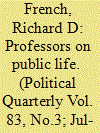

|
|
|
|
|
| Publication |
2012.
|
| Summary/Abstract |
Many academics misunderstand public life and the conditions under which policy is made. This article examines misconceptions in three major academic traditions-policy as science (e.g., 'evidence-based policy'), normative political theory, and the mini-public school of deliberative democracy-and argues that the practical implications of each of these traditions are limited by their partial, shallow and etiolated vision of politics. Three constitutive features of public life, competition, publicity and uncertainty, compromise the potential of these traditions to affect in any fundamental way the practice of politics. Dissatisfaction with real existing democracy is not the consequence of some intellectual or moral failure uniquely characteristic of the persona publica, and attempts to reform it are misdirected to the extent that they imagine a better public life modeled on academic ideals.
|
|
|
|
|
|
|
|
|
|
|
|
|
|
|
|
| 13 |
ID:
117484
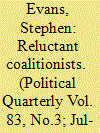

|
|
|
|
|
| Publication |
2012.
|
| Summary/Abstract |
The Conservative party has been the real awkward partner in the Conservative-Liberal Democrat coalition government because its backbench MPs have rebelled more frequently than their Liberal Democrat counterparts since May 2010. This reflected the fact that the Conservatives were reluctant coalitionists to begin with: they would have preferred to see a minority Conservative government, they had made far too many concessions to the Liberal Democrats, they had been bounced into accepting a coalition deal by a controlling party leadership, and they had lost out on those ministerial positions now held by Liberal Democrats. There was thus no great enthusiasm for the establishment of a coalition government with the Liberal Democrats in the parliamentary Conservative party in May 2010. Conservatives merely resigned themselves to an outcome which they had been given little opportunity to influence and which David Cameron had made it very difficult for them to reject.
|
|
|
|
|
|
|
|
|
|
|
|
|
|
|
|
| 14 |
ID:
117487
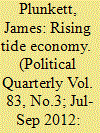

|
|
|
|
|
| Publication |
2012.
|
| Summary/Abstract |
For all its rhetorical potency, the policy implications of the 'squeezed middle' are yet to be fully explored. This article looks at what the phenomenon means for the design and prosecution of progressive economic policy. It argues that any progressive government today needs to adopt a new first order goal of economic policy: ensuring that the material wellbeing of ordinary working people rises when the economy grows, a project referred to as 'building a rising tide economy'. This objective would sit in addition to the traditional goals of sustained GDP growth, high employment, low inflation and poverty reduction. It would have real implications across a range of important policy areas.
|
|
|
|
|
|
|
|
|
|
|
|
|
|
|
|
| 15 |
ID:
117492
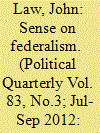

|
|
|
|
|
| Publication |
2012.
|
| Summary/Abstract |
Debate on the relevance (or otherwise) of federalism to the development of the European Union is often characterised by mutual incomprehension on either side. Close inspection, however, reveals that the high temperature of argument may not be solely due to differing visions of the finalite politique. For the precise meaning of the federal concept in political science remains unsettled. This article looks back to the earliest origins of federalism, in order to establish a firm basis for suggesting improvements. The idea of divided sovereignty, 'invented' in America and now thought to lie at the heart of the federal concept, is identified to be a false construction. On these grounds, it is proposed that the definition of federalism be clarified today as not 'a division of sovereignty between two levels of government', but instead 'a division of the powers flowing from sovereignty between two levels of government of equal status'.
|
|
|
|
|
|
|
|
|
|
|
|
|
|
|
|
| 16 |
ID:
117497
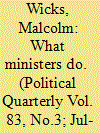

|
|
|
|
|
| Publication |
2012.
|
| Summary/Abstract |
Having been a minister in three different departments for a period of over nine years (1999-2008), during the Blair and, briefly, the Brown governments, I thought it might be useful to reflect on what ministers actually do, their functions and how they spend their days. In thinking about what I did as a minister, I have avoided going back to some of the classic constitutional texts on what ministers supposedly do, how they are accountable and such like. I am sure there is good literature on this from political scientists and constitutionalists, but I have avoided influencing my own views and approach by consulting these texts.
|
|
|
|
|
|
|
|
|
|
|
|
|
|
|
|
| 17 |
ID:
117488
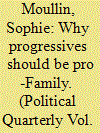

|
|
|
|
|
| Publication |
2012.
|
| Summary/Abstract |
For egalitarians, families are part of the problem. By bringing together advantages and passing on to their children, families redouble and (literally) reproduce inequalities. And, by cordoning off a private sphere into which government cannot roam, the family marks the limits of any progressive agenda. But defending families should be part of any answer to social injustice. Family relationships should be seen as a primary good: we need close, caring committed relationships no matter what else we want in life. Families are also increasingly important to one's chances in life. The gulf is widening between those rich and those poor in family life. This should worry egalitarians because lacking good, stable family relationships is a major disadvantage, and one that holds back progress towards other aspects of social justice.
|
|
|
|
|
|
|
|
|
|
|
|
|
|
|
|
|
|
|
|
|